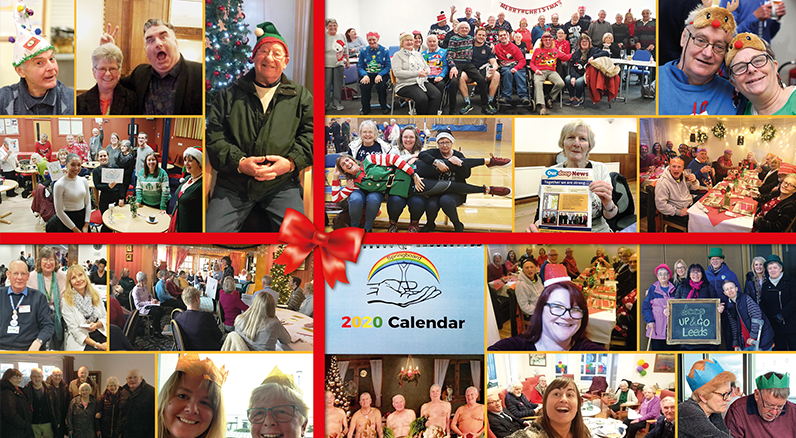I’ve been hearing voices for the last 20 years or so.
Little niggles that made me deeply uncomfortable about how some dementia services operated; about why people practised in certain ways; and about why people with dementia were treated (or not!) in certain ways. I can’t be the only one who has heard some of these voices over the years. Here are a couple of examples:
‘Why’, asked the voice in my head, ‘is this the only illness where so much in terms of information and service is directed at the person without the diagnosis?’
I was a ‘carers support coordinator’ and ran support groups and information programmes. Was I perpetuating this one-sided approach? ‘So where is the information for those living with dementia?’ continued the voice.
I was never comfortable about the term BPSD. ‘Why the blame?’, asked the voice.
I had often thought these questions had come to me through intelligent intuition. It had to be an innate (or nurtured) sense of justice that made me feel revulsion whenever reference was made to ‘managing’ people, as if items on a factory production line. It was surely that same intuition that made me wince upon hearing yet another disparaging or sweeping statement about ‘them’ by an over-stressed, under-equipped staff member or care partner. It has served me well. Or has it?
Apart from putting £2 at 100/1 on Wigan Athletic to win the FA Cup in 2013, that intuition regularly tends to desert me on a Saturday afternoon when having a bet. So why, then, did I hear these voices? Because they weren’t born in my head.
They were the voices of real people They had been spoken, shouted, screamed or whispered to me over the years by people living with dementia.
They were there in the deafening silence of the person withdrawn to the point of powerless passive resignation, no longer able to respond with what was once a quick retort, for example. ‘I don’t count any more, in conversation, in relationships’.
They were there in front of me in the distressed actions and reactions of the most impaired. They were there in the form of a letter from Richard, demanding to know why he was excluded from a carers’ information course his wife was attending. ‘I’ve got a right to be included too. After all, I’m the one with the diagnosis’. The huge effort he had made to get his message across was evident in the already failing handwriting on the page. Subsequently, Richard and I set up a local forum of people with dementia – the Stirrers’ group as he called it.
They were there in the table-thumping cries of Gill: ‘It’s not our fault. We must be allowed to make mistakes!’ And in Rita’s exasperated explanation: ‘You might think it’s irrational for me to scream and shout sometimes, but I have to be like that – otherwise I’m nobody’.
They were there in the silly arguments, or even blazing rows, I’d witness amongst families, desperate for a break from the many antagonisms that dementia was presenting them. They were there in the clear yearning of couples to be equipped with strategies to just get along better together at home, where they spend the vast majority of their time.
They were there in all the unanswered questions that so many people had, coming out of a meeting, having just received news of a devastating incurable condition and with something vague about powers of attorney and driving ringing in their ears. ‘So, what does this mean? How long have I got?’; What will happen?’
They were there in the statement from Elizabeth: ‘My biggest complaint about dementia is other people’; and in the desire of peer groups to develop an information course including a session about addressing the possible challenging Behavioural and Psychological Symptoms of Carers (BPSC)!
The dementia voices are out there, all the time, in the most eloquent and in the most impaired. We must continue to listen and get comfortable with that discomfort! Over the years, many of us have responded to these voices in our own sphere of influence. This is great, and it has given rise to some excellent practice examples dotted around the country.
But we have been asking ourselves – what could be achieved if we could find a way to allow grassroots voices to resonate with, and influence, a much wider audience? It is with thanks to funding from The National Lottery Community Fund that we are in a position to seek to do just that as we launch the Dementia Voices project.
Dementia Voices will allow us to better harness the collective potential of the DEEP network (over120 peer groups of people with dementia UK wide); the Dementia Diaries project (a growing, relevant and current resource of first-hand testimonies); and the Dementia Enquirers project (putting people with dementia in the driving seat of research). It is about:
- Supporting more people to have their voices heard, and finding new ways to achieve this
- Being more strategic in ensuring these voices can have maximum impact in the places where they can do the most good
- Placing more control in the hands of people with dementia themselves.
We are delighted that The National Lottery Community Fund recognises the role that the voices of people living with dementia can play in building momentum for a necessary cultural shift in how dementia policy and services are designed, developed and delivered in neighbourhoods, communities, regionally, nationally and beyond. We hope you recognise it too.
So, what does this mean in practice? Well, there is a huge amount that can be done. The dementia voices are still out there as an inexhaustible resource to help you all revisit how you operate. Ask yourselves:
- To what extent are people with dementia really in control of leading the service agenda, locally, regionally nationally?
- How much input have people with dementia had in developing and delivering services?
Any strategy or approach built on dementia voices needs to include the space for ongoing and consistent engagement with people with dementia, not one-off engagement exercises. People tell us they are tired of that.
Every area needs the establishment of groups of people with dementia that are growing, evolving, interested and engaged. It is no accident that the members of peer groups like Minds and Voices in York, for example, are always keen to get involved in projects and research. It’s born of a freedom and a sense of belonging to a group, something that is common to all those groups in the existing DEEP network. We can help you build your own local networks which are able to tap into that national network of dementia voices too.
Dementia Voices is also about tapping into the experience of people with dementia, whatever the intensity of their condition, so as to ensure more diverse voices are heard and responded to – to match the need to support people through to end of life, for example.
Dementia voices have been telling us for years to end that post diagnostic no-man’s land; to offer information programmes led by peers that answer the questions that people with dementia have; to equip families to avoid the pitfalls of living with the presence of a dementia in the house; to end the blame game; to present information clearly and precisely; to have respite that provides the sort of break that works for BOTH partners; to provide hospital stays without unnecessary delays; to talk openly about end of life, and so much more.
So, listen to the voices, no matter how uncomfortable they make you feel. They’re not in your head, they are real and all around you, and growing louder. Listen to the Dementia Voices.
Now I’ve got a funny feeling Blackpool might be in for a good cup run this year – I’m off to the bookies!
Damian Murphy
Co-Director, Innovations in Dementia
January 2020

